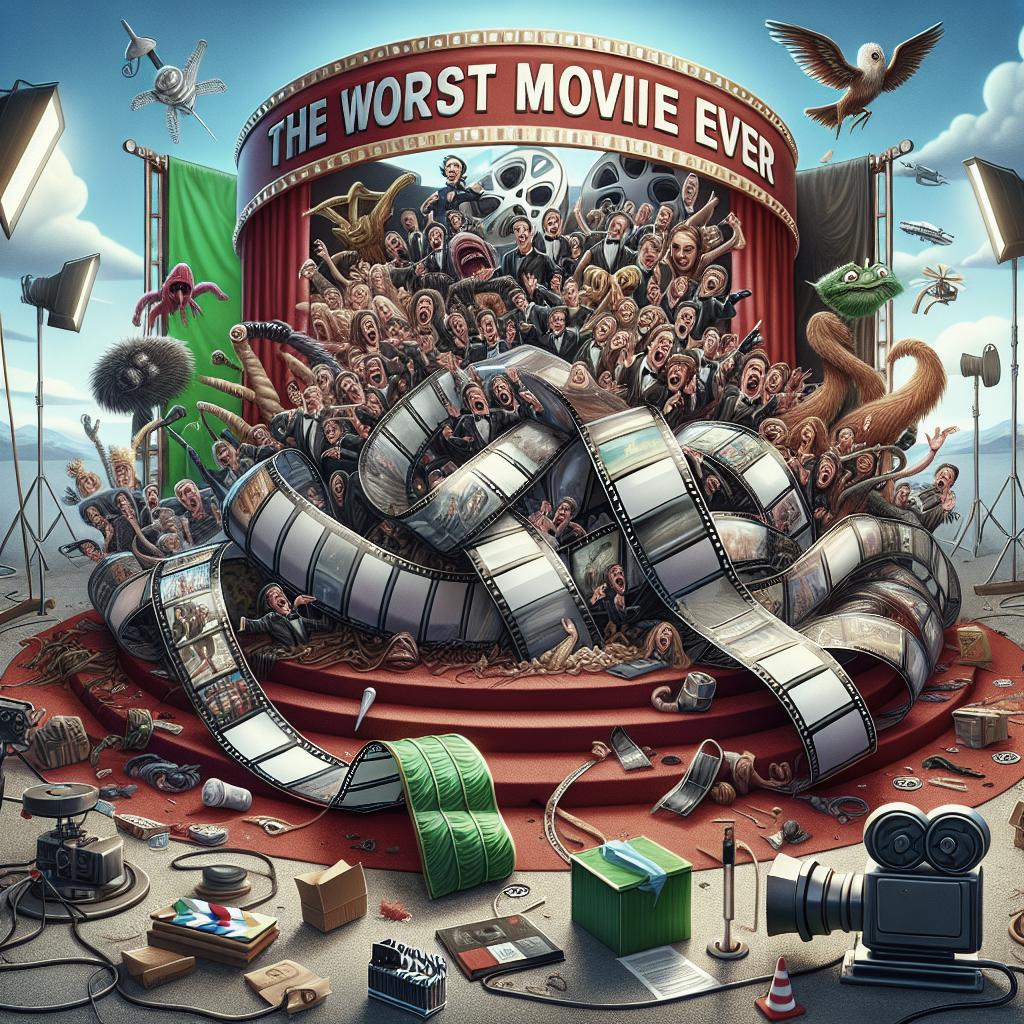“`html
If you’ve ever been intrigued by movies that are so bad they’re good, then you need to know about “The Room.” Often dubbed as the worst movie ever made, “The Room” has achieved a cult status for its perplexing storyline, bizarre acting, and mysterious creator. This blog post delves into what makes “The Room” so special—or particularly bad, why its weirdness stands out among other bad movies, how it got made, the enigmatic personality behind it, and how it led to the creation of “The Disaster Artist.” Finally, we’ll discuss whether you should watch “The Room” or read “The Disaster Artist” first, ahead of their film adaptations.
What is The Room?
“The Room” is a 2003 independent film written, directed, produced by, and starring Tommy Wiseau. The film follows a melodramatic love triangle between Johnny (played by Wiseau), his fiancée Lisa, and his best friend Mark. With its peculiar plot lines, awkward dialogue, and unconventional acting, “The Room” was initially intended to be a serious drama but has become celebrated as an unintentionally comedic masterpiece.
The intrigue behind “The Room” also stems from the limited information we have about Wiseau himself, who has been cryptic about his background and how he financed the film. The movie was initially panned by critics but has since gained an enthusiastic cult following, complete with late-night screenings and audience participation, elevating it from a failed project to a cinematic enigma.
Lots of movies are weird. Why is this one the weirdest?
Over the years, numerous movies have been deemed “weird” for various reasons—unique directors, strange narratives, or avant-garde visual styles. “The Room” manages to stand out even among these oddities due to its inexplicably disjointed storytelling and Wiseau’s mysterious persona. The film features scenes and subplots that appear and disappear without any logical explanation, and characters behave in ways that defy basic human understanding.
Part of the movie’s weirdness comes from its dialogue, which is often nonsensical or laugh-out-loud funny despite its intention to be serious. Memorable lines like “You’re tearing me apart, Lisa!” have sparked laughs and become iconic within the cult movie lexicon. The eccentricities don’t stop there—from the painfully awkward sex scenes to rooftop confessions—it’s a film constantly confounding audience expectations in the best worst ways.
How did this get made?
The making of “The Room” is as strange as the film itself. Tommy Wiseau financed the film’s $6 million budget through mysterious means that he has never fully disclosed. Some speculate that Wiseau amassed his wealth through real estate investments, but the true source remains one of Hollywood’s lingering mysteries. The film’s production was marked by Wiseau’s unconventional choices, such as shooting the movie simultaneously on 35mm film and HD video, leading to significant budget bloating.
Wiseau’s lack of filmmaking experience became evident during production. The crew was often baffled by his unique directing methods and choices. There were frequent script changes, reshoots, and confusing shifts in tone. The disarray extended to the casting as well, with actors often replaced mid-production. Ultimately, the chaotic making of “The Room” contributed to its peculiar charm and fascinating backstory.
So who is Tommy Wiseau?
Tommy Wiseau remains an enigmatic figure in the world of cinema. His mysterious background has fueled endless speculation. Wiseau claims to be from New Orleans, but his thick, unplaceable accent and contradictory statements suggest otherwise. Some rumors even speculate that he might be from a European country. Despite the numerous questions about his past, Wiseau has maintained secrecy about his life before “The Room.”
Wiseau’s eccentric personality extends beyond the film. His public appearances, interviews, and marketing tactics further solidify his place as a cult figure. He often appears in public wearing sunglasses, refuses to answer personal questions, and deflects discussions about his mysterious wealth. This air of bewilderment around Wiseau only adds to the fascination with “The Room” and its unique creator.
How did all of this lead to The Disaster Artist?
In 2013, one of the actors from “The Room,” Greg Sestero, co-wrote a memoir titled “The Disaster Artist” with Tom Bissell. The book offers an insider’s look at the making of “The Room” and provides a detailed portrayal of Tommy Wiseau. Sestero’s account gives readers a mix of humor, drama, and bewilderment, making it a riveting read for fans and newcomers alike. The book quickly gained attention and praise, even earning a Best Non-Fiction Award from the National Arts & Entertainment Journalism Awards.
The popularity of “The Disaster Artist” eventually led to its adaptation into a film in 2017, directed by and starring James Franco as Tommy Wiseau. The movie also features his brother Dave Franco as Greg Sestero. The film adaptation brought a new level of mainstream attention to “The Room” and Wiseau, introducing a broader audience to this bizarre cinematic phenomenon. It even garnered an Oscar nomination for Best Adapted Screenplay.
Should I watch The Room or read The Disaster Artist before the new movie?
If you are a movie buff and enjoy experiencing cinematic oddities firsthand, watching “The Room” should be your priority. The movie’s peculiarities are best appreciated in their original, unfiltered form. Viewing “The Room” will give you a firsthand understanding of why the film has captivated audiences, and you’ll gain context for the events described in “The Disaster Artist.” Be prepared for an experience that is as entertaining as it is bewildering.
Reading “The Disaster Artist” beforehand adds another layer of appreciation. The memoir provides background, insider anecdotes, and a behind-the-scenes look at the making of the movie, enhancing your viewing of “The Room.” Whether you choose to read the book or watch the film first, both experiences complement each other, offering a well-rounded understanding of this unique Hollywood anomaly.
Most Popular
Discrimination against trans Olympians has roots in Nazi Germany
Understanding the origins of discrimination against trans athletes necessitates a historical dive back into Nazi Germany. The systemic prejudices formed during that era laid the groundwork for the challenges faced by athlete today.
Modern implications continue to affect policy and public opinion, urging society to re-evaluate old biases and strive towards a more inclusive athletic community.
Why two astronauts are stuck in space
In an unprecedented event, two astronauts find themselves stuck in space due to a technical malfunction. Despite multiple efforts from mission control, the situation remains unresolved, placing both astronauts in a precarious position.
This incident underscores the inherent risks of space travel and serves as a stark reminder of the challenges faced by humans as they venture beyond Earth.
Chuck Schumer’s ambitious plan to take the Supreme Court down a peg
U.S. Senator Chuck Schumer is spearheading an initiative aimed at recalibrating the influence of the Supreme Court. His proposed measures seek to introduce checks and balances that limit the Court’s overarching authority.
While supporters commend the plan for promoting accountability, opponents argue it could undermine judicial independence, making this a hotly debated topic in American politics.
The movement desperately trying to get people to have more babies
As birth rates decline globally, a movement has emerged advocating for policies and incentives to encourage people to have more children. Supporters argue that increasing the birth rate is essential for sustaining economic growth and social welfare systems.
Critics, however, contend that the focus should instead be on improving the quality of life and addressing environmental concerns rather than simply increasing population numbers.
The Trump-Vance campaign would be great if not for Trump and Vance
Initially, the Trump-Vance political campaign showed promise with its strong platforms and charismatic candidates. However, controversies and questionable statements made by both Trump and Vance have overshadowed the campaign’s positive aspects.
The campaign’s struggles highlight the significant impact of a candidate’s public image and the importance of maintaining a consistent, uncontroversial narrative to secure voter support.
Today, Explained
For an in-depth analysis of these stories and more, tune into “Today, Explained.” This podcast offers comprehensive coverage of current events, featuring expert opinions and detailed explanations to give listeners a well-rounded understanding of the most pressing issues of the day.
Whether you’re catching up on the news during your commute or looking for a nuanced take on today’s headlines, “Today, Explained” provides valuable insights and keeps you informed on the go.
| Section | Content |
|---|---|
| What is The Room? | An introduction to “The Room,” its plot, and the surface-level reasons for its cult status. |
| Lots of movies are weird. Why is this one the weirdest? | Analysis of what sets “The Room” apart from other unconventional films. |
| How did this get made? | A look into the baffling production process of the movie. |
| So who is Tommy Wiseau? | An exploration of the mysterious persona behind the movie, Tommy Wiseau. |
| How did all of this lead to The Disaster Artist? | Insight into how the creation of “The Room” inspired the book and subsequent movie “The Disaster Artist.” |
| Should I watch The Room or read The Disaster Artist before the new movie? | Discussion on whether to watch the film or read the book first for an enhanced experience. |
| Most Popular | Brief summaries of the most popular news stories covered on the blog. |
| Today, Explained | Promotion of the podcast “Today, Explained” for more in-depth news analysis. |
“`


